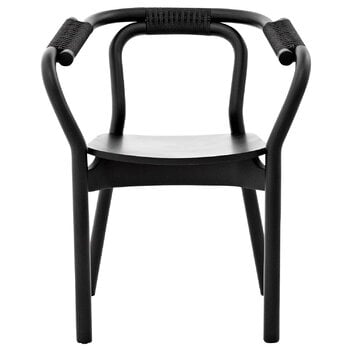Knot chair, designed by Tatsuo Kuroda from Japan, combines traditional materials with a modern look. For his Knot chair, Kuroda has been inspired by the Danish classic furniture, where aesthetics is as important as functionality. The beautiful details of the chair might remind of the design of the 1950s. The frame of the Knot chair is made of ash and the joint points are in natural paper cord.
Knot chair, black
Normann Copenhagen
Description
Knot chair, designed by Tatsuo Kuroda from Japan, combines traditional materials with a modern look. For his Knot chair, Kuroda has been inspired by the Danish classic furniture, where aesthetics is as important as functionality. The beautiful details of the chair might remind of the design of the 1950s. The frame of the Knot chair is made of ash and the joint points are in natural paper cord.
Product details (6)
- Colour
- Black
- Width
- 58.5 cm
- Depth
- 50.5 cm
- Height
- 72 cm
- Seat height
- 43 cm
- Material
- Ash, paper cord
- Product ID
Designer
The Japanese designer Tatsuo Kuroda graduated from Tama Art University in 2006. After this he finished a Master’s Degree at Design Academy of Eindhoven and in 2010 he founded his own studio. Shape, touch and use are important issues for Kuroda in his design and believes that fine products will be loved longer.
View all productsReviews (0)
Sustainability
The Product Sustainability Framework, our criteria of sustainable design, helps you find the most sustainable products in our selection. Read below which sustainability criteria this product has met.
Working conditions & labour 7/9
-
Equal opportunities for all employees
-
Commitment to UN Global Compact, fair compensation for all employees
-
Corporate responsibility requirements defined and communicated for suppliers
-
Systematic work for improved inclusion and well-being in the workplace
-
Transparent supply chain
-
Suppliers' compliance to a code of conduct ensured
-
Compliance to the UN Guiding Principles on Business and Human Rights ensured in the supply chain
-
Direct suppliers audited and certified
-
Support for community involvement in the supply chain
Eco-friendly production 6/9
-
Fair and resource-wise water-use in production
-
No incineration or landfilling of returned items
-
No use of endangered species as materials
-
No direct environmental emissions or waste (excl. GHGs) from production
-
Material-efficient and ecological packaging
-
No potentially harmful chemicals used in own production
-
The sustainability of direct suppliers' production is addressed and monitored
-
Production and material sourcing that respect biodiversity, animal rights, and natural ecosystems
-
Positive impact on nature’s well-being through operations that regenerate natural ecosystems
Climate impact 5/8
-
Company's direct greenhouse gas emissions identified and commitment to reduction
-
Product's carbon impact identified and commitment to reduction
-
Guidance on energy- and eco-efficient use of the product
-
Contribution to climate initiatives beyond the brand’s direct operations
-
Carbon footprint of the product calculated and goals set to reduce it
-
Low-carbon or compensated transportation
-
100 % renewable energy in own production and operations
-
Carbon neutral or carbon negative product
Sustainable materials 3/6
-
Sustainable and long-lasting material choices
-
No harmful or hazardous substances
-
Responsible raw material sourcing and production
-
Materials suited for circularity: monomaterials, recyclable finishings, renewable or recycled contents etc.
-
Ecological materials: natural, biodegradable, recyclable or recycled contents
-
Outstanding materials in terms of innovativeness, responsibility, sustainability and circularity: local production or sourcing, 100 % recycled content, C2C-certification etc.
Circular design 3/5
-
High aesthetic quality promoting long-term use of the product
-
Technically durable product design and material choices
-
Design for enduring life-long quality
-
Design and support for product maintenance, repair and upgradability
-
Innovative circular design solutions: circular service system, resale platform, remanufacturing, collection of used products, etc.








